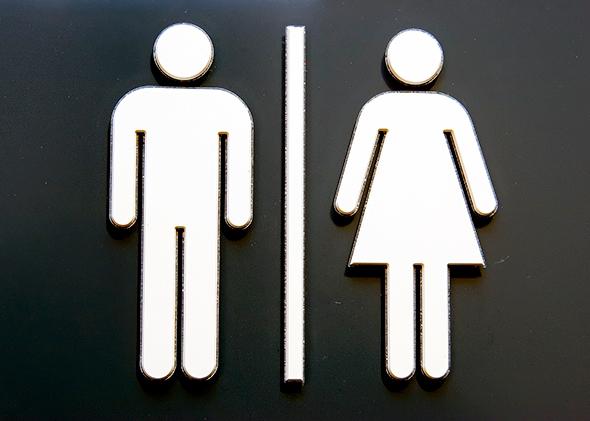I recently had a negative experience and the opportunity to reflect on it.
I was at a friend’s birthday party at a Toronto club. After checking my coat, I proceeded to the restrooms. I watched a man go in one and a woman enter the other. Checking the doors, I found no gendered signage. Still, it was impossible to mistake them as anything but restrooms.
Had the club gone gender-free? That’s wicked-sauce, I thought, as I strode into the room on the left (which turned out to be sans-urinals) and made my way to a stall.
I was impressed and planned to spread this great news on Twitter, so after I’d completed my ablutions, I strode back to the coat check and enthusiastically enquired, “Are your washrooms gender-free?”
It felt like a rhetorical question, since I’d just enjoyed a delightful and non-stressful gender-free restroom experience, absent the usual concern over potential judgment from others—whom past experience has taught me might, for whatever reason, be more interested in how I look than in their own experience of urination and hand-washing. Such reactions have ranged from rudeness and harsh offense to unwanted sexual advances, depending on which binary-gendered restroom I’d selected when forced to make the choice.
There would appear to be a great concern among certain cis people that I, by virtue of my transness, might opt to do something that would inappropriately disrupt their restroom routine, as they have all too often done with mine.
But no, for once I wasn’t on my usual guard. In fact, I was feeling happy and relaxed when I asked her about their washroom policy. I was expecting some cool response like “Yep, since last year,” or “The new owner converted them,” or “We want to create a safer space for everyone here.”
I wasn’t expecting painful awkwardness on par with meeting a cis friend’s confused but inquisitive grandparents.
“Are your washrooms gender-free?” I asked.
The club employee affected an expression in equal parts maternal and conciliatory. “They’re not, but I don’t see any problem with you using the ladies room. We have people … We have people who come in, and … It really isn’t any problem …”
Right away I am uncomfortable. Clearly she’s read me as trans. Is it because I asked about restroom gendering? Because she thinks only a trans person would care about restroom gendering? Is it because I look like shit today? Do I look like shit today?
Wait, Cool your jets, I thought. There are no signs on the doors. Obviously this club is evolving, staying cool and hip, acknowledging the phenomenon of trans and genderqueer and non-binary people and the fact that even cis people are starting not to care about separating washrooms by “dress” versus “no dress.”
As an aside, can you imagine a planet where all genders wear dresses? Except half of them wear dresses that are white on the right side and black on the left, and the other half wear dresses in the reverse pattern? And everyone on that planet fights incessantly about it? Well, that’s this planet, and that’s exactly how ridiculous and nonsensical binary gender seems, to many trans people.
So what if she’s read me as trans. Who cares. The real story here is those bathroom doors. So I ask again for clarification, straining to be heard over the thumping music.
“No, I mean, the rooms, are they intended to be gendered? Male and female? Or does the club not care?”
“Yes,” she answered cryptically, “but it’s perfectly fine for you to use the ladies room, too. That would be OK here.”
That’s not what I asked you, I growled internally. I certainly don’t need anyone’s permission to pee: This isn’t kindergarten.
Now I’m pissed. I’m just trying to ask a simple, straight-forward question about the club’s policy on gendered restrooms, and I’m getting unwanted judgment for being trans. Mild judgment, maybe, but judgment all the same, and it’s still a slap in the face. The worst part is, she doesn’t mean to be completely rude and condescending, and she doesn’t even realize that’s what she’s doing. So, taking the stress she’s caused me out on her, while emotionally justifiable, would be an unproductive waste of a teachable moment.
So I smiled, engaged a great deal of mindfulness and self-control, and continued in a polite and congenial tone.
“OK,” I began. “So just to be clear, I would definitely use the women’s room anywhere I had to choose between that and men’s. That would always be valid, and I don’t need anyone’s permission. What I’m actually asking is, why are there no signs on those doors?”
She shrugged. “People keep tearing them down,” she said, in a tone I can only describe as apologetic.
Aha! Now I understood: My kindred warriors had come before me. Glorious.
My fake smile found itself replaced with half of a genuine one. “Well,” I offered. “Good for those people,” I said, in congratulatory fashion.
Here’s what I hope she learned from what, based on her behavior, might very well have been her first ever interaction with a real live trans person: Don’t make assumptions about us or our motivations. Don’t think you’re better than us, and definitely, definitely, don’t talk to us like you think you’re better than us. I got the impression she expected me to be grateful she’d let me pee in the women’s restroom: I’m not; in fact I’m deeply offended she would even think I might question that legitimacy. Cis people are the ones who do that, and they need to stop it.
Also, cis people are occasionally ridiculous to us, and if you keep it up, you can expect more of us to tear down your nonsense binary restroom signs.
